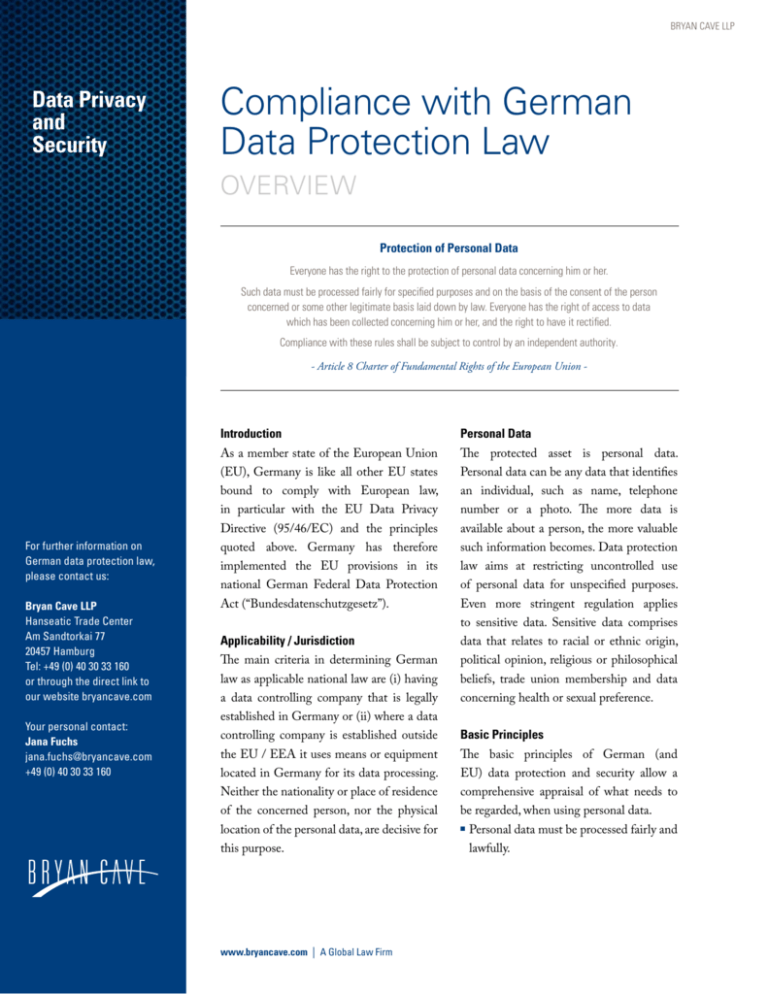Compliance with German Data Protection Law
advertisement

BRYAN CAVE LLP Data Privacy and Security Compliance with German Data Protection Law OVERVIEW Protection of Personal Data Everyone has the right to the protection of personal data concerning him or her. Such data must be processed fairly for specified purposes and on the basis of the consent of the person concerned or some other legitimate basis laid down by law. Everyone has the right of access to data which has been collected concerning him or her, and the right to have it rectified. Compliance with these rules shall be subject to control by an independent authority. - Article 8 Charter of Fundamental Rights of the European Union - For further information on German data protection law, please contact us: Bryan Cave LLP Hanseatic Trade Center Am Sandtorkai 77 20457 Hamburg Tel: +49 (0) 40 30 33 160 or through the direct link to our website bryancave.com Your personal contact: Jana Fuchs jana.fuchs@bryancave.com +49 (0) 40 30 33 160 Introduction As a member state of the European Union (EU), Germany is like all other EU states bound to comply with European law, in particular with the EU Data Privacy Directive (95/46/EC) and the principles quoted above. Germany has therefore implemented the EU provisions in its national German Federal Data Protection Act (“Bundesdatenschutzgesetz”). Applicability / Jurisdiction The main criteria in determining German law as applicable national law are (i) having a data controlling company that is legally established in Germany or (ii) where a data controlling company is established outside the EU / EEA it uses means or equipment located in Germany for its data processing. Neither the nationality or place of residence of the concerned person, nor the physical location of the personal data, are decisive for this purpose. www.bryancave.com | A Global Law Firm Personal Data The protected asset is personal data. Personal data can be any data that identifies an individual, such as name, telephone number or a photo. The more data is available about a person, the more valuable such information becomes. Data protection law aims at restricting uncontrolled use of personal data for unspecified purposes. Even more stringent regulation applies to sensitive data. Sensitive data comprises data that relates to racial or ethnic origin, political opinion, religious or philosophical beliefs, trade union membership and data concerning health or sexual preference. Basic Principles The basic principles of German (and EU) data protection and security allow a comprehensive appraisal of what needs to be regarded, when using personal data. n Personal data must be processed fairly and lawfully. DATA PRIVACY AND SECURITY Personal data must be collected for explicit and legitimate purposes and must be used accordingly. n Personal data must be relevant and not excessive in relation to the legitimate purpose. n Personal data must be accurate and if necessary kept up to date. n The concerned individual (data subject) must be able to rectify, erase or block incorrect data. n Personal data must not be kept longer than necessary. n Personal data must be protected by appropriate technical and organizational measures against unauthorized or unlawful processing, accidental loss and destruction. n Data Processing The legal term ‘data processing’ stands, in particular, for the collection, storage, modification and transfer of personal data. All modalities of data usage are restricted in the same way. Personal data may only be processed, n if the data subject has unambiguously given his or her prior consent or n if data processing is permissible under the statutory exemptions applying to data processing. The above requirements of data processing do not in the same manner apply to sensitive data. In principle, such data may not be processed. Derogation is only permissible under very specific circumstances, e.g. with the data subject’s explicit consent (referring to the processing of sensitive data) or if the processing of such data is mandated by German employment law. Consent The data subject’s consent generally has to be in writing (electronic form is permissible in specific cases, e.g. online consent) and it needs to be voluntary and expressed after being adequately informed about the intended data processing and its purpose. www.bryancave.com | A Global Law Firm Statutory Exemptions - Data Processing without Consent Without the data subject’s prior consent, data processing is only allowed to the extent permissible by law. According to statutory law, processing personal data without consent is permitted, in particular, in cases where the data processing is necessary for certain business purposes or where data processing serves public interest. For example, data processing is legitimate (without the data subject’s prior consent) to the extent that is necessary for the performance of a contract involving the data subject. n to the extent that such data processing is covered by the legitimate interest of the processing entity and nothing leads to the assumption that the data subject’s privacy interest prevails the entity’s legitimate interest. n if the personal data was publicly available. n Data Collection From a practical perspective, legitimate collection of personal data (with-out explicit prior consent) e.g. from employees and customers is very important and concerns most companies. As the collection of data is usually the first step of data processing, any unlawful collection of personal data affects the entire course of data processing. Direct Collection Even if the collection of personal data is generally covered by consent or a statutory exemption provision, the data processing entity still needs to comply with the principle of direct collection. Personal data generally has to be collected directly from and therefore with the knowledge of the data subject. Data collection without the data subject’s knowledge (indirect collection) is subject to a few statutory exemptions, e.g. in cases where direct collection would be commercially unreasonable as opposed to indirect collection. DATA PRIVACY AND SECURITY Information Duties When collecting data directly from an individual, the data subject needs to be informed about n the responsible data controller, n the purpose of data processing and n the recipients of the data. Indirect collection, generally requires the collector to inform the data subject accordingly after the collection of such data. Limitation by Purpose Any collected personal data my only be used for the specified purpose in compliance with the information given to the data subject. For other purposes the data may only be processed, for example, n if the processing entity or a third party has a legitimate interest in doing so; n if the data is available to the public; n for defense of public danger and criminal prosecution; n and in a very limited way for commercial purposes. When personal data is legitimately used for commercial purposes, the data subject needs to be informed about the right to object to such use. The objection has to be observed. Data Transfer The transfer of collected data is a very common use of data. German data protection law defines transfer as forwarding of data to a third party. Without the data subject’s prior consent, the transfer has to be covered by the statutory exemptions, e.g. the transfer has to be necessary for the performance of a contract involving the data subject or is covered by the legitimate interest of the processing entity. www.bryancave.com | A Global Law Firm Data Transfer within a Group of Companies Companies within a group of companies are not generally privileged. Each company is regarded a separate entity. The forwarding of data from one company to another within a group of companies qualifies as transfer of data to the effect that the general restrictions on data processing apply. The exemption based on the processing entity’s legitimate interest is often referred to for justification. In these cases, however, the legitimate interest needs to be demonstrated for every individual transfer. If, for instance, the transfer of data in an anonymized form had served in the purpose equally, the transfer of personal data may no longer be covered by the legitimate interest. Also, when relying on the exemption based on legitimate interest, such interest has to prevail the data subject’s privacy interest. Data Processing on Behalf Forwarding data to a third party is not considered as transfer of data, provided that the processing entity has by contract assigned the third party to process such data on its behalf and also provided that such data processing contract complies with corresponding data protection regulation. Such data processing contract has to include e.g. clear and binding instructions by the party providing the data (data exporter) to be strictly observed by the party receiving the (data importer). The data importer may only use the data ac-cording to such instructions. Such instructions have to ensure that the data importer fully observes German data protection law. However, vis-à-vis the data subject or other concerned parties (e.g. competitors), the data ex-porter remains fully liable for any violation of data protection law. Data Transfer to the U.S. The EU considers the U.S. a country with an inadequate level of data protection. This evaluation leads to a general prohibition of data transfer from the EU to the U.S. To DATA PRIVACY AND SECURITY avoid interference with economic needs, exemptions are regulated to allow such transfer. Regardless of such exemptions every data transfer still requires a legal basis, i.e. without the concerned data subject’s consent such transfer needs to be explicitly exempted from the consent requirement by the German Data Protection Act. The aforementioned exemptions generally apply when the data exporter ensures that the data importer (in the U.S. or any other state regarded as not having an adequate level of data protection) provides an adequate level of data protection according to EU standards. Adequate Level of Data Protection With the U.S. not being part of the small group of countries being regarded as having an adequate level of data protection by the EU Commission, for companies doing business in or with the U.S. there remain three possible tools for ensuring that the data importer complies with the EU data protection principles and thus is regarded as having an adequate level of data protection. n Safe Harbor Certification n EU Model Contracts for Data Transfer n Binding Corporate Rules Other exemptions – Direct business / interest exemptions n Few other exemptions apply in particular when explicit consent was given, to cases where direct business with a data subject in the EU is concerned or to prevailing public interest. Should an exemption apply, the data importer needs to be instructed that the transferred data may only be used for the purpose it was originally transferred for. Compliance Control German legislation has established two control instances for data security compliance. All companies processing www.bryancave.com | A Global Law Firm data, except for small businesses, have to assign a data protection officer (DPO). In addition, each federal state has installed a data protection authority (DPA). Data Protection Officer Every German company that employs more than 9 persons with automated processing of personal data is obliged to appoint a Data Protection Officer (DPO). Regardless of the headcount, a DPO always has to be appointed if the data processing company commercially transfers personal data (e.g. address trade, marketing database). The DPO needs to be assigned in writing within one month after the beginning of operations. The assigned DPO has to be an adequately qualified and reliable person, e.g. an employee. The DPO obligation may also be outsourced allowing an external assignee to supervise internal data processing (e.g. certified attorneys or certified DPO service providers). No conflicts to his or her duties may arise, should the DPO also serve in an-other position. The DPO is not subject to any instructions by the management of the entity, when conducting his or her duties as DPO. With respect to the organization of the company, the DPO needs to be positioned directly under the management. Furthermore, statutory law provides for a certain level of protection with regard to the DPO’s position as data protector and with the DPO’s position as employee. In return and under strict provisions, the DPO can be personally liable for breaches of compliance. Data Protection Authority For companies which are not required to assign a DPO, the local Data Protection Authority (DPA) is the responsible control instance. In addition, the DPO is entitled to address the DPA in cases of doubt to seek reassurance of his or her evaluation. DATA PRIVACY AND SECURITY Registration and Breach Notification Duties To enable the DPA to perform supervision, companies are generally obliged to register their data processing tools and activities with the local DPA. However, where companies have assigned a DPO the registration duties are usually waived. Therefore a registration in Germany is rather the exception than the rule. In the event of a data breach companies must generally notify their local DPA and the persons affected by the breach if their data has been unlawfully disclosed and such disclosure forms a threat of serious danger to the concerned person (e.g. bank account data). Technical Measurement and Organization Processing entities have to ensure that appropriate technical and organizational security measures are installed to ensure an adequate level of data security. This includes e.g. access control, data safety and data accuracy. Consequences of Violation Violation of data protection law could cause different legal consequences. Some examples are outlined below: n Civil claims by data subjects (tort). n Civil claims by competitors (in case of interference with unfair competition law). n Monetary Fines up to EUR 300.000 for regulatory offences and possibly more if the economic benefit of the breach exceeds this amount. n Criminal charges leading to higher fines or imprisonment. Summary n Be aware that usage of personal data is generally restricted. n Determine whether your company is required to appoint a DPO. n Find adequate and reliable DPO. n Review internal data processing for compliance with your DPO. n Address local DPA in cases of doubt. n If your company is not required to appoint DPO, find adequate consultancy to ensure compliance. n Instruct your employees to ensure compliance. n Install and observe necessary data protection measures. Please note that the EU Commission is currently working on a reform of the European data protection law. The reform proposal was presented in January 2012 and will lead to significant changes to the existing legal framework when passed as proposed. The time frame for the reform process is expected to be another 2 – 3 years. In addition the German legislator is also working on a reform of the legal framework for the processing of employee data. We will keep you updated About Bryan Cave Bryan Cave LLP (www.bryancave.com) has a diversified international legal practice. The firm represents a wide variety of business, financial, institutional and individual clients, including publicly held multinational corporations, large and mid-sized privately held companies, partnerships and emerging companies. Aided by extensive investments in technology, Bryan Cave’s more than 1,000 attorneys across the United States, the United Kingdom, Continental Europe and Asia serve clients’ needs in the world’s key business and financial markets. Bryan Cave LLP makes available this information letter for informational purposes only. The information is general in nature and does not constitute individual legal advice. Further, the use of the information provided herewith does not create any attorney-client relationship between us. www.bryancave.com | A Global Law Firm






